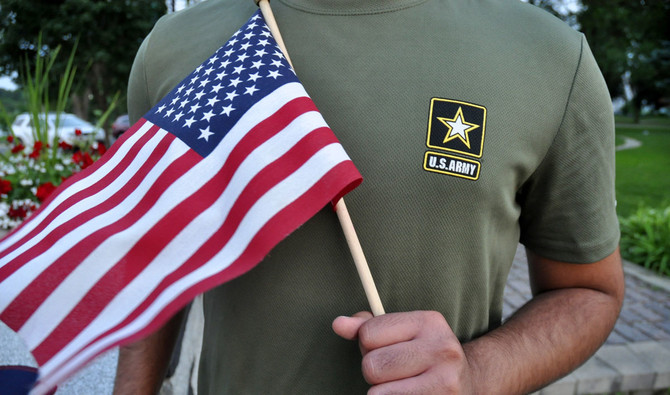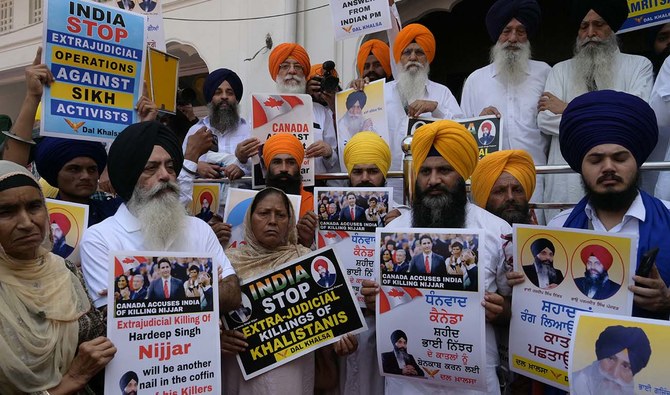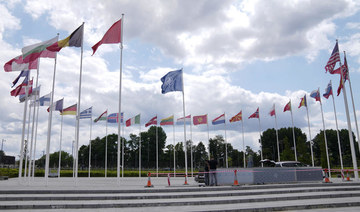SAN ANTONIO: Some immigrant US Army reservists and recruits who enlisted in the military with a promised path to citizenship are being abruptly discharged, the Associated Press has learned.
The AP was unable to quantify how many men and women who enlisted through the special recruitment program have been booted from the Army, but immigration attorneys say they know of more than 40 who have been discharged or whose status has become questionable, jeopardizing their futures.
“It was my dream to serve in the military,” said reservist Lucas Calixto, a Brazilian immigrant who filed a lawsuit against the Army last week. “Since this country has been so good to me, I thought it was the least I could do to give back to my adopted country and serve in the United States military.”
Some of the service members say they were not told why they were being discharged. Others who pressed for answers said the Army informed them they’d been labeled as security risks because they have relatives abroad or because the Defense Department had not completed background checks on them.
Spokespeople for the Pentagon and the Army said that, due to the pending litigation, they were unable to explain the discharges or respond to questions about whether there have been policy changes in any of the military branches.
Eligible recruits are required to have legal status in the US, such as a student visa, before enlisting. More than 5,000 immigrants were recruited into the program in 2016, and an estimated 10,000 are currently serving. Most go the Army, but some also go to the other military branches.
To become citizens, the service members need an honorable service designation, which can come after even just a few days at boot camp. But the recently discharged service members have had their basic training delayed, so they can’t be naturalized.
Margaret Stock, an Alaska-based immigration attorney and a retired Army Reserve lieutenant colonel who helped create the immigrant recruitment program, said she’s been inundated over the past several days by recruits who have been abruptly discharged.
All had signed enlistment contracts and taken an Army oath, Stock said. Many were reservists who had been attending unit drills, receiving pay and undergoing training, while others had been in a “delayed entry” program, she said.
“Immigrants have been serving in the Army since 1775,” Stock said. “We wouldn’t have won the revolution without immigrants. And we’re not going to win the global war on terrorism today without immigrants.”
Stock said the service members she’s heard from had been told the Defense Department had not managed to put them through extensive background checks, which include CIA, FBI and National Intelligence Agency screenings and counterintelligence interviews. Therefore, by default, they do not meet the background check requirement.
“It’s a vicious cycle,” she said.
The AP interviewed Calixto and recruits from Pakistan and Iran, all of whom said they were devastated by their unexpected discharges.
“Now the great feeling I had when I enlisted is going down the drain,” said Calixto, 28. “I don’t understand why this is happening.”
In hopes of undoing the discharge, he filed a lawsuit in Washington, D.C., last week alleging the Defense Department hadn’t given him a chance to defend himself or appeal. He said he was given no specific grounds other than “personnel security.”
Calixto, who lives in Massachusetts and came to the US when he was 12, said in an email interview arranged through his attorney that he joined the Army out of patriotism.
In the suit, Calixto said he learned he was being kicked out soon after he was promoted to private second class.
The Pakistani service member who spoke to the AP said he learned in a phone call a few weeks ago that his military career was over.
“There were so many tears in my eyes that my hands couldn’t move fast enough to wipe them away,” he said. “I was devastated, because I love the US and was so honored to be able to serve this great country.”
He asked that his name be withheld because he fears he might be forced to return to Pakistan, where he could face danger as a former US Army enlistee.
Portions of the 22-year-old’s military file reviewed by the AP said he was so deeply loyal to the US that his relationships with his family and fiancee in Pakistan would not make him a security threat. Nonetheless, the documents show the Army cited those foreign ties as a concern.
The man had enlisted in April 2016 anticipating he’d be a citizen within months, but faced a series of delays. He had been slated to ship out to basic training in January 2017, but that also was delayed.
An Iranian citizen who came to the US for a graduate degree in engineering told the AP that he enlisted in the program hoping to gain medical training. He said he had felt proud that he was “pursuing everything legally and living an honorable life.”
In recent weeks, he said, he learned that he’d been discharged.
“It’s terrible because I put my life in the line for this country, but I feel like I’m being treated like trash,” he said. “If I am not eligible to become a US citizen, I am really scared to return to my country.”
He spoke on condition of anonymity because of those fears.
It’s unclear how the service members’ discharges could affect their status as legal immigrants.
In a statement, the Defense Department said: “All service members (i.e. contracted recruits, active duty, Guard and Reserve) and those with an honorable discharge are protected from deportation.”
However, immigration attorneys told the AP that many immigrants let go in recent weeks were an “uncharacterized discharge,” neither dishonorable nor honorable.
The service members affected by the recent discharges all enlisted in recent years under a special program aimed at bringing medical specialists and fluent speakers of 44 sought-after languages into the military. The idea, according to the Defense Department, was to “recognize their contribution and sacrifice.”
President George W. Bush ordered “expedited naturalization” for immigrant soldiers in 2002 in an effort to swell military ranks. Seven years later the Military Accessions Vital to the National Interest program, known as MAVNI, became an official recruiting program.
It came under fire from conservatives when President Barack Obama added DACA recipients — young immigrants who were brought to the US illegally — to the list of eligible enlistees. In response, the military layered on additional security clearances for recruits to pass before heading to boot camp.
The Trump Administration added even more hurdles, creating a backlog within the Defense Department. Last fall, hundreds of recruits still in the enlistment process had their contracts canceled. A few months later, the military suspended MAVNI.
Republican Congressman Andy Harris of Maryland, who has supported legislation to limit the program, told the AP that MAVNI was established by executive order and never properly authorized by Congress.
“Our military must prioritize enlisting American citizens, and restore the MAVNI program to its specialized, limited scope,” he said.
Non-US citizens have served in the military since the Revolutionary War, when Continental soldiers included Irish, French and Germans. The US recruited Filipino nationals to serve in the Navy in the 1940s, and worked to enlist Eastern Europeans in the military over the next decade, according to the Defense Department.
Since Sept. 11, 2001, nearly 110,000 members of the Armed Forces have gained citizenship by serving in the US military, according to the Defense Department.
Many service members recruited through the program have proven to be exemplary. In 2012, then-Sgt. Saral K. Shrestha, originally from Nepal, was named US Army Soldier of the Year.
In general, the immigrant recruits have been more cost-effective, outperforming their fellow soldiers in the areas of attrition, performance, education and promotions, according to a recently released review by the RAND Corporation, a nonprofit research institution.
The AP spoke with a 26-year-old woman from Dominica who said she proudly enlisted in the immigrant recruitment program in 2016 while earning her nursing degree. She said she drilled each month with her reserve unit, which gave her an award, and had been awaiting a date to start basic training.
But in March, she said she looked up her profile on an Army portal and saw that the section about her security eligibility was marked “loss of jurisdiction,” with no further explanation. The next month, her attorney said she found the reservist’s name listed as “unsuitable” on a spreadsheet created by the Defense Department.
The reservist, who spoke on condition of anonymity because of concerns about her legal standing, said she received additional paperwork last month that indicated her case is awaiting a final decision.
“I have always been a good soldier and have always done what they ask me to do,” she said. “I got into debt when I joined the Army because I can’t work legally but, financially, I can’t survive anymore. I don’t want to give up because I genuinely like being in the Army. But I don’t know who to turn to.”
In recent years, a group of attorneys have been fighting to keep their recruited immigrant clients eligible for naturalization as delays have mounted. Some have been successful, including nearly 50 recruits who were granted a type of temporary status while their background investigations are being completed.
“Some of our clients have finally emerged through the system and at least are doing basic training,” said Donald Friedman, a Washington attorney with Perkins Coie.
US Army quietly discharging immigrant recruits
US Army quietly discharging immigrant recruits

Canada arrests fourth Indian national in killing of Sikh activist

- Three Indian nationals were arrested this month for Sikh separatist leader Hardeep Singh Nijjar last year
- Killing sparked diplomatic tow between two countries after Canadian PM linked Indian intelligence to killing
MONTREAL: A fourth Indian national was charged by Canadian authorities Saturday in the 2023 killing of a separatist Sikh leader in Vancouver.
Amandeep Singh, 22, was already being held for unrelated gun charges before being charged with “first-degree murder and conspiracy to commit murder” in the slaying of Hardeep Singh Nijjar.
Three other Indian nationals were arrested this month.
The killing sparked a diplomatic row between Ottawa and New Delhi when Prime Minister Justin Trudeau linked Indian intelligence to the killing.
Nijjar — who immigrated to Canada in 1997 and became a citizen in 2015 — had advocated for a separate Sikh state, known as Khalistan, carved out of India.
He had been wanted by Indian authorities for alleged “terrorism” and conspiracy to commit murder — allegations he denied.
He was shot dead on June 18, 2023, by masked assailants in the parking lot of the Sikh temple he led in suburban Vancouver.
Trudeau announced several months later that Canada had “credible allegations” connecting Indian intelligence to the slaying.
India dismissed the allegations as “absurd” and responded furiously, briefly curbing visas for Canadians and forcing Ottawa to withdraw diplomats.
In November, the US Justice Department charged an Indian citizen living in the Czech Republic with allegedly plotting a similar assassination attempt on American soil.
Prosecutors said in unsealed court documents that an Indian government official was also involved in the planning.
The shock allegations came after US President Joe Biden hosted Indian Prime Minister Narendra Modi for a rare state visit, as Washington seeks closer ties with India against China’s growing influence.
US intelligence agencies have assessed that the plot on American soil was approved by India’s top spy official at the time, Samant Goel, the Washington Post reported in April.
Canada is home to some 770,000 Sikhs, who make up about two percent of the country’s population, with a vocal minority calling for an independent state of Khalistan.
Concern about Russia dominates as Lithuanians vote

- While the top three contenders have diverging views on Lithuania’s relations with China, they agree on helping Ukraine in its war against Russia
- The Baltic state of 2.8 million people fears it could be next in Russia’s crosshairs if Moscow wins its war against Ukraine
VILNIUS: Lithuania votes Sunday in a presidential election dominated by security concerns with the main candidates all agreed the NATO and EU member should boost defense spending to counter the perceived threat from neighboring Russia.
The Baltic state of 2.8 million people fears it could be next in Russia’s crosshairs if Moscow wins its war against Ukraine, which began with an invasion in 2022.
While the top three contenders agree on defense, they have diverging views on social issues and on Lithuania’s relations with China, which have been strained for years over Taiwan.
“Lithuania’s understanding of the Russian threat is unanimous and unquestionable, so the main candidates are following suit,” Eastern Europe Studies Center director Linas Kojala told AFP.
Polls close at 1700 GMT and the result is expected later on Sunday — although a run-off on May 26 will probably be needed as no candidate is expected to win an overall majority.
Opinion polls give the incumbent, 59-year-old former banker Gitanas Nauseda, a comfortable lead over the other seven candidates, who include Prime Minister Ingrida Simonyte and prominent lawyer Ignas Vegele.
The Lithuanian president steers defense and foreign policy, attending EU and NATO summits, but must consult with the government and parliament on appointing the most senior officials.
Lithuania, a former Soviet republic, is a top donor to Ukraine and a big defense spender, with a military budget currently equal to 2.75 percent of GDP.

Defense spending
The Simonyte-led government is expected to come forward with proposals within several weeks that could help increase defense spending even further to three percent.
Lithuania notably intends to use the funds to purchase tanks and additional air defense systems, and to host a German brigade, as Berlin plans to complete the stationing of around 5,000 troops by 2027.
None of the top candidates appear to question these plans, but Vegele has pledged to ask for a defense audit to effectively manage finances if he is elected.
Nauseda is projected to receive more than 35 percent of the vote in the first round, according to the latest opinion poll, and is expected to prevail in any eventual run-off.
Vegele, a 48-year-old lawyer who gained prominence after speaking out against mandated vaccination during the pandemic, presents himself as an alternative to established politicians and vows more transparent governance.
Simonyte, 49, is a fiscal conservative with liberal views on social issues. She notably supports same-sex partnerships, which still stir controversy in the predominantly Catholic country.
Simonyte is running for president for a second time after losing to Nauseda in a run-off in 2019.
“Simonyte is supported by conservative party voters and liberal people, while Nauseda is a candidate of the left in terms of economic and social policy,” Vilnius University analyst Ramunas Vilpisauskas told AFP.
Meanwhile, “Vegele will get support from those who simply want change,” he added.

Divergence over China
The uneasy relationship between Nauseda and his rival Simonyte’s ruling conservatives has at times triggered foreign policy debates, most notably on Lithuania’s relations with China.
Bilateral ties turned tense in 2021, when Vilnius allowed Taiwan to open a de facto embassy under the island’s name in a departure from the common diplomatic practice of using the name of the capital Taipei to avoid angering Beijing.
China, which considers Taiwan a part of its territory and bristles at support for the island that might lend it any sense of international legitimacy, downgraded diplomatic relations with Vilnius and blocked its exports.
This sparked controversy among Lithuanian politicians, with some urging a restoration of relations for the sake of the Lithuanian economy.
“China’s reaction to the opening of the office was harsher than predicted, and that sparked the debate,” Kojala said, adding that China’s response was hurting local businesses.
Trump tells Jersey Shore crowd he’s being forced to endure ‘Biden show trial’ in hush money case

- The former president’s extraordinary legal woes, which include three other unrelated criminal cases, have emerged as a central issue in the campaign
WILDWOOD, N.J.: Sandwiched between his appearances in court, Donald Trump headed on Saturday to the Jersey Shore, where he repeatedly blamed President Joe Biden for the criminal charges he’s facing as the presumptive nominees prepare to face off in the November election and called his New York hush money case “a Biden show trial.”
Blasting the Democratic president “a total moron,” Trump before a crowd of tens of thousands repeatedly characterized the cases against him as politically motivated and timed to harm his ability to campaign.
“He’s a fool. He’s not a smart man,” Trump said of Biden. “I talk about him differently now because now the gloves are off.”
Trump, the presumptive Republican presidential nominee, drew what his team called a “mega crowd” to a Saturday evening rally in the southern New Jersey resort town of Wildwood, 150 miles (241 kilometers) south of the New York City courthouse where he has been forced to spend most weekdays sitting silently through his felony hush money trial.
Lisa Fagan, spokesperson for the city of Wildwood, told The Associated Press that she estimated a crowd of between 80,000 and 100,000 attendees, based off her own observations on the scene Saturday, having seen “dozens” of other events in the same space.
Trump was joined on stage by several high-level endorsers including North Dakota Gov. Doug Burgum and NFL Hall of Fame linebacker Lawrence Taylor, who is still listed as a registered sex offender after pleading guilty in New York in 2011 to misdemeanor criminal charges of sexual misconduct and patronizing an underage prostitute.
The beachfront gathering, described by Rep. Jeff Van Drew, R-N.J., as the largest political gathering in state history, was designed to serve as a show of force at a critical moment for Trump, who is facing dozens of felony charges in four separate criminal cases with the election less than six months away.
Hours before he was scheduled to take the stage, thousands of Trump loyalists donning “Never Surrender” T-shirts and red “Make America Great Again” hats crowded onto the sand between the boardwalk and carnival rides to greet the former Republican president.
“The everyday American people are 100 percent behind him,” said Doreen O’Neill, a 62-year-old nurse from Philadelphia.
“They have to cheat and smear him and humiliate him in that courtroom every single day,” O’Neill said. “This country is going to go insane if they steal the election again.”
Trump’s extraordinary legal woes, which include three other unrelated criminal cases, have emerged as a central issue in the campaign.
Trump has repeatedly accused the Biden administration and Democratic officials in New York of using the legal system to block his return to the White House. Prosecutors allege the former president broke the law to conceal an affair with a porn actor that would have hurt his first presidential bid.
On Saturday, Trump posited that even those whom he accuses of politically motivated prosecutions didn’t bring every case they could have, pointing to the boosts his campaign has sustained with each wave of charges.
“I heard they were going to do a couple of other things and they said from Washington ... ‘we’re indicting him into the White House,’” Trump said. “They said, ‘Don’t do it.’”
While Trump seized on his legal woes Saturday, a judge’s gag order — and the threat of jail — limit Trump’s ability to comment publicly on witnesses, jurors and some others connected to the New York trial, which is expected to consume much of the month. The judge in the case already has fined Trump $9,000 for violating the order and warned that jail could follow if he doesn’t comply.
The order doesn’t include references to Judge Juan M. Merchan, whom Trump called “highly conflicted” or District Attorney Alvin Bragg, both of whom Trump said are “doing the bidding for crooked Joe Biden.”
Trump’s responsibilities as a defendant have limited his ability to win over voters on the campaign trail.
He spent last week’s off-day from court in the general election battlegrounds of Wisconsin and Michigan. And he was campaigning with tens of thousands of voters Saturday in New Jersey, a reliably Democratic state. Parts of New Jersey have deep-red enclaves and the southern shoreline in particular draws tourists and summer homeowners from neighboring Pennsylvania, a key swing state.
Biden, meanwhile, opened his weekend with a series of fundraising events on the West Coast.
He avoided Trump’s legal challenges — as he has done consistently — while addressing donors in Seattle. Instead, the Democratic president focused on Trump’s recent interview with Time magazine in which the Republican former president said states should be left to determine whether to prosecute women for abortions or to monitor their pregnancies.
Saturday’s visit to the New Jersey Shore resort wasn’t Trump’s first.
While president, Trump held a rally there in January 2020 to thank Van Drew, the New Jersey congressman who had just left the Democratic Party for the GOP as a rebuke for the former president’s first impeachment.
Trump drew a crowd at the time that lined the streets, filled bars and supported numerous vendors in what is usually a sleepy city in the winter. This time, the summer season is around the corner for the resort known for its wide beaches and boardwalk games and shops.
Wildwood is in New Jersey’s 2nd District, which Van Drew has represented for three terms and covers all or part of six counties in southern New Jersey. It went for Trump in 2016 and again in 2020 after earlier backing Barack Obama.
Trump is set to return to the courtroom next week, when key prosecution witness Michael Cohen, Trump’s fixer-turned-foe, is expected to take the witness stand. Last week, he was visibly angry at times as he was forced to sit through testimony from former porn actor Stormy Daniels, who described a sexual encounter with the former president in shocking detail.
Trump is charged with 34 counts of falsifying internal Trump Organization business records. The charges stem from paperwork such as invoices and checks that were deemed legal expenses in company records. Prosecutors say those payments largely were reimbursements to Cohen, Trump’s attorney, who paid Daniels $130,000 to keep quiet.
The prosecution could rest its case by the end of the week. It’s unclear if Trump himself will take the stand when the defense presents its case.
Back on the Jersey Shore, 65-year-old Pat Day said she felt some urgency to see Trump in person on Saturday.
“We want to see Trump before they take him out,” said Day, who was visiting from the Florida Keys. “I’m worried. They’re going to do everything they can so he doesn’t get elected again.”
US university apologizes after contractors spray paint in faces of pro-Palestine protesters

LONDON: The president of a Cleveland university in the US state of Ohio has apologized to students after hired contractors sprayed pro-Palestinian demonstrators in the face earlier this week while attempting to cover up a mural, local media has reported.
Students at Case Western Reserve University painted the Advocacy and Spirit walls on Monday night with the Palestinian flag and messages that included “I dream of breaking the siege,” “Come together in peace” and the number of Palestinian children killed in Gaza since war between Israel and Hamas broke out in October, Cleveland.com said.
Prompted by an unprecedented attack by Hamas on Oct. 7, Israel retaliated with an offensive that has so far killed almost 35,000 people in Gaza, mostly women and children, according to the territory’s health ministry.
A video showed the students, who are accusing the contractors of assault, trying to block the contractors from painting over the wall by standing in front of it, and one student wearing a face shield, was seen completely covered in white paint.
The video was shared by the Plain Dealer and Cleveland.com by Case’s Students for Justice in Palestine group.
The contractors had been hired by the university’s president, Eric Kaler, early on Tuesday because “the administration said the messaging was ‘threatening, intimidating and antisemitic,’” Cleveland.com said, adding that he later released a statement apologizing to the community for the incident, saying he was “disturbed by what occurred.”
He added: “Let me be clear: No students — or any individuals — should ever be treated this way, especially on a campus where our core values center on providing a safe, welcoming environment. This is not who we are as an institution, and I am deeply sorry this ever occurred.”
Palestinian-Ameican student, Ameer Alkayali, 18, who was seen being completely sprayed in the video, said: “I stood against the wall, and the painters asked ‘Should we continue?’ The cops showed general confusion and didn’t tell them to stop. So, as seen in the video, they continue to just paint right over us.
“They told us to not put our hands in front of the machine because it’s dangerous. And we put our hands up, and they still continued to paint on our hands and sprayed us with it?”
Alkayali, who has been protesting with Case students sine they set up their encampment last week has also previously been detained and released by local police and now says “plans to take legal action against Case’s administration and its public safety department,” Cleveland.com reported.
“We were coughing, and it didn’t come out of my skin for hours,” he said. “Like it’s still in my hair. I can see it under my nails, and there was no sort of medical or any assistance with the situation after from Case or local police.”
Case said it was investigating the incident and since then, the wall has been painted over with a pro-Israeli message, saying: “They call for intifada so we call them terrorists.”
“Kaler said the college will ‘hold individuals responsible for this behavior, including the failure of our own officers to intervene,’” Cleveland.com said.
On Wednesday, “Cleveland Mayor Justin Bibb and the city’s police chief, Annie Todd, urged Kaler and his administration to think of the students’ rights,” the news outlet said.
“We support 1st Amendment rights and implore CWRU leadership to consider this and think about how the decisions they make and the actions they take – especially against those who are abiding by the law – will influence some of the progress we have collectively made as a city. At the same time, we urge individuals to demonstrate peacefully,” Bibb and Todd said.
Sit-ins and demonstrations demanding an end to the Israeli war on the Gaza Strip continued to spread across several American and European universities, while local media reported that US police have arrested or detained more than 2,400 students who participated in protests in support of Palestine.
Thousands of pro-Palestinian protesters rally in Madrid

- Spain is one of Israel’s harshest critics in Europe and leading efforts to recognize a Palestinian state
MADRID: Thousands of pro-Palestinian demonstrators marched through Madrid on Saturday to demand a ceasefire in war-torn Gaza and a severing of ties between Spain and Israel.
Numbering around 4,000 according to the authorities, protesters held up banners and signs condemning a “genocide” in Gaza and lauding the “resistance” of the Palestinian people.
Palestinians have been “crammed” in southern Gaza and “now they are displaced again from one place to another while there are no more safe places,” said 57-year-old Jaldia Abubakra, referring to Israeli evacuation orders in the city of Rafah.
Around 30 organizations called for the rally before the 76th anniversary of what Palestinians call the “Nakba” (“catastrophe“), when 760,000 people fled their homes during the 1948 war that accompanied Israel’s creation.
Spanish students have set up peaceful sit-ins and camps at universities in Madrid, Barcelona and Valencia in recent days, mirroring similar pro-Palestinian campus movements across the United States and Europe.
Earlier this week, Spanish universities expressed willingness to suspend ties with any Israeli educational institution that failed to express “a clear commitment to peace.”
Spain is one of Israel’s harshest critics in Europe and leading efforts to recognize a Palestinian state.
The Gaza war started with Hamas’s unprecedented October 7 attack on Israel, which resulted in the deaths of more than 1,170 people, mostly civilians, according to an AFP tally of Israeli official figures.
Militants also seized hostages, of whom Israel estimates 128 remain in Gaza, at least 36 of whom the military says are dead.
Israel’s retaliatory offensive has killed at least 34,971 people in Gaza, mostly women and children, according to the Hamas-run territory’s health ministry.



















